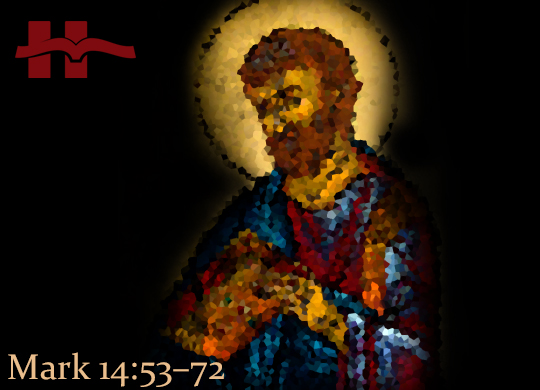Mark 14:53−72

Faithfulness in discipleship involves self-denial for the cause of Jesus, without concern for self-preservation.
But he denied [it] ….
But again he denied [it] ….
But he began to curse and swear ….
Mark 14:68, 70, 71
The “sandwich” structure (Peter in the outside stories, 14:53–54, 66–72; Jesus in the inside, 14:55–65) is a masterpiece of literary creation, especially in this pericope: Jesus and Peter are compared in two separate trials—Peter, too, was in a “trial” here. One is captive, the other free; one is inside, the other outside; both are accused three times; three responses of each are noted; one tells the truth and is condemned to die, while the other lies and saves himself.
That Peter “followed” (14:54) reminds the reader that this was a disciple, one who had been called to follow (1:18; 2:14). Yet this following here is tainted, for Peter follows “from a distance”; moreover, he was not “with Jesus” as disciples had been appointed to be in 3:14, but “with the officers,” 14:54.
Also note that the words stressing the multiplicity of Jesus’ accusers (and emphasizing his abandonment by his disciples), “all,” “whole,” and “many,” respectively (14:53, 55, 56), are in contrast to the solitary accuser facing Peter, at least initially (explicitly noted as “one,” 14:66). Peter quails before this lone servant girl, while Jesus stands strong before the whole Sanhedrin and a multiplicity of accusers and false witnesses (14:55). The disciple is unable to deny himself even before so meager a host of prosecutors.
Jesus’ faithfulness and forthrightness, despite the risk of condemnation and execution, is in stark contrast to Peter’s unfaithfulness and deceitfulness in an attempt to escape risk and danger—an unwillingness on part of the disciple to deny himself. Moreover, Peter negates his call from Jesus to be “with Him” (3:14), an appointment which the servant-girl accurately gauges: “You also were with Jesus” (14:67). Servant girls may guess correctly, but this disciple does not care. He responds: “I neither know nor understand what you are saying” (14:68). He was lying, of course; so also his last words in this Gospel: “I do not know this man” (14:71). Lying again, he was denying Jesus, not denying himself as he had been called to do (8:33–34). But in another sense, one suspects that this bumbling disciple was, in fact, being perfectly truthful: Peter neither knew nor understood who Jesus was and what Jesus was about. He never had. In fact, none of the Twelve fully understood Jesus’ person and suffering mission. One of them, of course, betrayed him. The rest ran away.
The contrast achieved by the juxtaposition of Jesus’ powerful and truthful self-declaration (14:61–62) and Peter’s shameful and vile cursing (14:71), could not be more poignant, crushing, and tragic. In the end, Peter has grossly and utterly violated Jesus’ command in 8:34 to deny oneself; he, instead, had denied Jesus. The last of the disciples to appear in the Gospel, Peter, too, had failed; he had been unfaithful at cockcrow. The “rock” had cracked!
Disciples, in short, are to be like Jesus, self-denying even at the threat of death, uninterested in self-preservation for its own sake, and always truthful, always faithful. They are to be unlike Peter, who to save his own skin, violated his appointment to be “with Jesus,” and transgressed his calling to deny himself, being untruthful and unfaithful to his Lord. In and through this “sandwich” structure, Mark declares that not to deny oneself is, in essence, a denial of Jesus.











 Abe Kuruvilla is the Carl E. Bates Professor of Christian Preaching at The Southern Baptist Theological Seminary (Louisville, KY), and a dermatologist in private practice. His passion is to explore, explain, and exemplify preaching.
Abe Kuruvilla is the Carl E. Bates Professor of Christian Preaching at The Southern Baptist Theological Seminary (Louisville, KY), and a dermatologist in private practice. His passion is to explore, explain, and exemplify preaching.
2 Comments
When consequences come because of your own wrong doing, you’ll always be caught in a situation where you’ll either defend or deny yourself. It’s always true for all of us, thank you for this reminder, pastor. Praise God for your ministry.
Thanks, Keith.